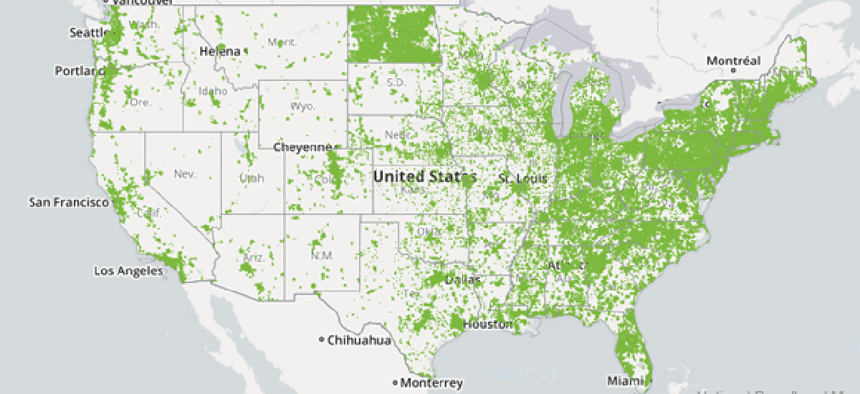Broadband deployments: Government gets busy


Connecting state and local government leaders
Broadband initiatives are heating up across the United States at all levels of government.
Broadband initiatives are heating up across the United States at all levels of government.
At the federal level, public housing residents will be receiving broadband Internet access at low or free prices, courtesy of the Obama administration. The pilot program is part of the larger ConnectHome initiative to provide broadband options that will close the digital divide.
About 275,000 households, including 200,000 children, will be eligible for free or low-cost ($9.95 per month) broadband access. The announcement, made mid-July, came at the same time as a report from the White House Council of Economic Advisors that highlighted the correlation between low Internet use and income. Less than half of the lowest-income families have home Internet service, according to the report. ConnectHome will be implemented in public housing units in 27 cities and one Native American tribal area, focusing on households with school-age children.
The Department of Agriculture also announced $85.8 million in total funding to strengthen access to high-speed broadband in rural areas. The $74.8 million in telecom loans and grants will fund equipment upgrades in Minnesota, South Carolina, Montana and Wisconsin. The $11 million in Community Connect grants will increase Internet access for rural Americans in seven states.
Massachusetts
Goshen, Mass., recently became the 20th town to authorize funding to build a fiber-optic network. In the last two months, 22 WiredWest communities in Western Massachusetts have passed bond authorizations totaling $34.5 million to build a regional fiber-optic network, according to WiredWest. Towns in Western Massachusetts have until June 2016 to authorize funding to meet the deadline for state funding of the project. Currently 15 towns have more than 40 percent of their premises subscribed for broadband access.
Kentucky
Kentucky ranks 47th in the nation in broadband access. In rural areas, approximately 23 percent of residents have no Internet access. The state’s KentuckyWired project will build fiber optic network, also referred to as the middle mile or backbone, that will allow broadband service to be brought closer to communities throughout Kentucky. The state is partnering with Australian investment bank Macquarie Capital to design and oversee the expansion costs, expected to be about $350 million over the next 30 years. The plan is to build the network at no cost to taxpayers. The first phase of the KentuckyWired project is anticipated to begin in August, when two communities will be chosen to work with consultants to develop broadband strategic plans.
New York
The New York City Economic Development Corporation (NYCEDC) announced the launch of the Broadband Expansion in Industrial Business Zones, or Connect IBZ, to improve access to high-speed Internet to underserved businesses in Brooklyn and Queens. The $5.3 million public-private partnership will create high-speed commercial broadband networks in the Southwest Brooklyn, Long Island City, North Brooklyn and Greenpoint-Williamsburg. The networks will be designed, constructed, maintained and operated by Stealth Communications Services and Xchange Telecom, two New York City-based ISPs. NYCEDC will provide over $1.6 million for the program from the New York State Connect NY Broadband Grant Program, with the remaining funds ($3.75 million) provided by the ISPs. The funding will cover the cost of building the network and buildouts to at least 500 commercial businesses over two years. Further expansion will be funded by the ISPs.
Iowa
Gov. Terry Branstad recently signed the “Connect Every Acre” broadband expansion bill, establishing a state-run grant program, although it would depend on money from the federal government, private-sector investors and nonprofits initially to fund the grants. While no state money will fund the program, companies that expand the reach of their high-speed broadband service into remote areas will receive a property tax exemption for 10 years.
Maryland
Sens. Ben Cardin and Barbara A. Mikulski, together with Rep. John Delaney (all D-Md.) announced that the Appalachian Regional Commission (ARC) awarded the Board of County Commissioners of Allegany County in western Maryland $100,000 for a project to expand public and private broadband access. The grant will fund the AllCoNet Backbone Microwave Link Upgrade Project. The AllCoNet Network provides broadband service to many critical public services in Allegany County including the 911 center, emergency management, sheriff's office, detention center, transit, state’s attorney, utilities, transportation, public schools, county library system, and fire departments in many cities and towns.
The grant also will fund the purchase and installation of 56 radios at spur tower locations, replacing obsolete equipment that is more than 15 years old in order to increase bandwidth and provide additional reliability. Allegany County and CONXX will both provide $50,000 in funding, bringing the total project funding to $200,000.




